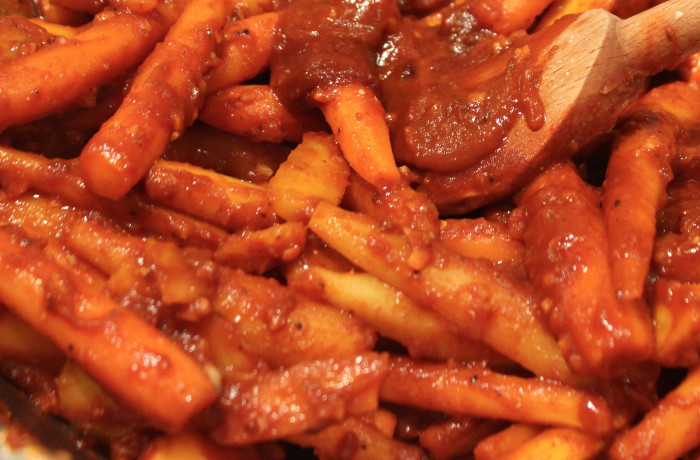We were at DeGustibus, the cooking school at Macy’s, listeing to Rawia Bishara discuss her new book Olives, Lemon, and Za’atar. She went to the core philosophy of cooking, her book, and her immensely satisfying Brooklyn restaurant Tanoreen. “Use what you have. Fresh. Today fresh,” she repeated throughout her demo.
She used harissa in the demo for a Turkish salad. We took her word and followed it. When we had an event for celiac patients and their families, we treated them to harissa and carrots. Earlier in the day, our produce vendor had mentioned he had carrots, lovely spring carrots with perfect tenderness. It was natural to follow Raiwa’s admonition. The carrots were gently poached, then mixed with harissa.
Your version of this will depend on the potency of the chile paste you use. It will be an adventure, unpredictable and exciting. If the results are too hot for you, you can try to dilute with a little more oil or lemon juice. Don’t add the cumin until you’ve done a taste test.
This hot sauce is, well, a hot sauce. It has universal application. In the Middle East, a primary use is with fish or, interestingly, in lentil soups. Or chicken, or on potatoes, or … I said universal and that is true.
With this recipe, you can make the real deal: authentic in ingredients and preparation, as real as the chile peppers that are its genesis.
Harissa
Yield: 2+ cups
Ingredients:
- 6 tablespoons extra-virgin olive oil
- 6 cloves garlic, finely chopped
- 2 cups chile paste
- 1 teaspoon ground cumin
- ½ teaspoon ground caraway seeds (optional)
- ½ teaspoon ground dill seeds (optional)
- ½ teaspoon freshly ground black pepper
- ⅔ cup fresh lemon juice
- Sea salt
Preparation:
Heat the oil in a saucepan over medium heat until hot. Add the garlic and cook until golden brown, 2 to 3 minutes. Sprinkle in the chile paste, cumin, caraway and dill seeds, if using, and pepper and cook, stirring, for 2 minutes. Pour in the lemon juice and ⅓ to ⅔ cup water, depending on desired consistency, and bring to a boil for 2 to 3 minutes.
Remove from the heat, let cool and season with salt. Transfer to a jar with a tight-fitting lid. The hot sauce will keep, refrigerated, for up to 1 month.
Source: Olives, Lemons, and Za’atar by Rawia Bishara
Photo Information: Canon T2i, EFS 60MM Macro Lens, F/5.6, 1/20th second, ISO-2500

